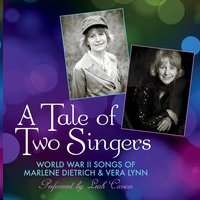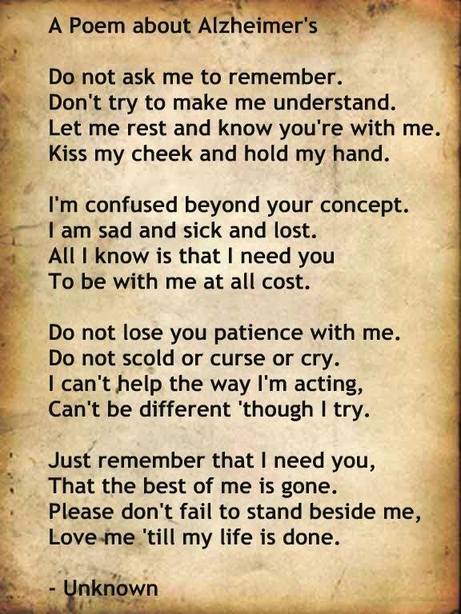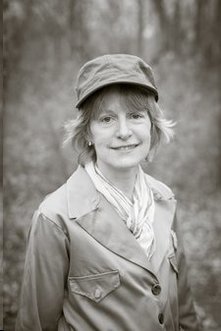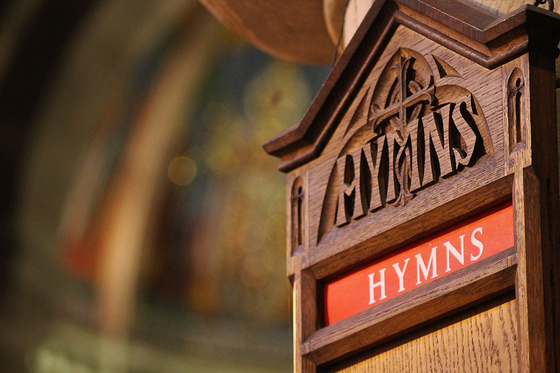|
Seen on Facebook. I could certainly be wrong, but it seems like the Alzheimer's patients who have the greatest peace are those whose children continue to visit and love them even as the deep confusion sets in.
1 Comment
 Looking for an enchanting way to entertain and edify a beloved elder – or a roomful of them? “A Tale of Two Singers” is sure to enthrall anyone with an appreciation for the World War II generation – and especially those who lived through the war, perhaps seeing their own loved ones go off to do battle with the enemies of freedom. Created and performed by my friend Leah Carson, “A Tale of Two Singers” features the songs of two World War II-era entertainers – Vera Lynn and Marlene Dietrich. And it includes rich commentary about the war, our war-fighters, the singers themselves and their music. Leah recently brought her hour-long show to Care-age of Brookfield, much to the delight of a large group of residents. The entire program was entertaining, educational, and extraordinarily moving. There are two ways you can bring “A Tale of Two Singers” to your home or facility:
For a sneak preview, watch this clip of Leah singing Vera Lynn’s “The White Cliffs of Dover.” (Hint: Maybe it's just me, but you might want to grab a hankie.) I’ve just finished preparing the hymns we’ll be singing for this month’s Christian Music Hour at the nursing home – and what a glorious time it will be, Lord willing!
The songs are organized into four groups, each to be introduced by a reading based on an essay by Dr. John D. Morris of the Institute for Creation Research. First, we’ll sing about what the Lord Jesus Christ has done for us, with:
Next, we’ll consider what His work on the cross means to us today, in this life, with these hymns:
We’ll then sing some of my very favorite hymns, each giving us a preview of what the cross means to the believer for all eternity:
Finally, we’ll finish with the only logical response to all of this: praise!
What an hour of worship it promises to be! “And He said to them, ‘Take heed and beware of covetousness, for one’s life does not consist in the abundance of the things he possesses.’” -- Luke 12:15
I’ve just been rereading Luke’s gospel, blown away by the incredible wisdom contained in every line. This verse really jumped out at me last night, probably because I was in the midst of planning additions to my 2015 garden when Jesus reminded me, for the thousandth time, that there are more important things in life than what I can pack into my garden. “One’s life does not consist in the abundance of the things he possesses.” For proof, imagine yourself in a nursing home -- you, who once lived in 2000- or 3000 or 4000-square-foot splendor, reduced to sharing a 15x20-foot room, your wardrobe pruned back to fit into a single dresser and armoire, your library decimated to whatever you can squeeze into an apartment-sized nightstand, your Christmas Wish List limited to tiny gift suggestions like postage stamps and a few blank birthday cards. There’s not much room for pursuing covetousness in such an environment – at least not if it’s directed at material goods. Fortunately, in sayings such as the one quoted above, Jesus destroyed the notion that possessions define our lives. And He followed it up with the parable of the rich man who needed more barns to store his crops – a stern warning against accumulating more and more possessions along the road to a life of ease (verses 16-21). You probably know people who spent their lives acquiring everything that appeals to them, working overtime to satisfy “the lust of the flesh, the lust of the eyes and the pride of life,” as John described it in chapter 2 of his first epistle. They stuffed their closets with clothing and their pantries with food and their garages with cars and recreational equipment, and when they ran out of room, if they could swing it, they moved on to bigger and better quarters. This sort of covetousness certainly dominated my life before I met the Lord Jesus Christ, and discovered that true satisfaction comes not from possessing but from being forgiven, that the only thing worth acquiring in this life is knowledge of my Creator and the assurance of spending all eternity with Him. But I wonder: what if I’d stayed lost? What if I still thought my happiness would be found “in the abundance of the things” possessed? How would I have handled the prospect of squeezing 2000 square feet of abundance into a 150-square-foot half-room, and calling it a life? I thank God that He does whatever is necessary to change the hearts and minds of anyone who is willing – and that, for those who are, He made the key to everlasting joy abundantly clear. “Do not fear, little flock,” He said in Luke 12:32,34, “for it is your Father's good pleasure to give you the kingdom. Sell what you have and give alms; provide yourselves money bags which do not grow old, a treasure in the heavens that does not fail, where no thief approaches nor moth destroys. “For where your treasure is, there your heart will be also.” |
Kitty
|





 RSS Feed
RSS Feed